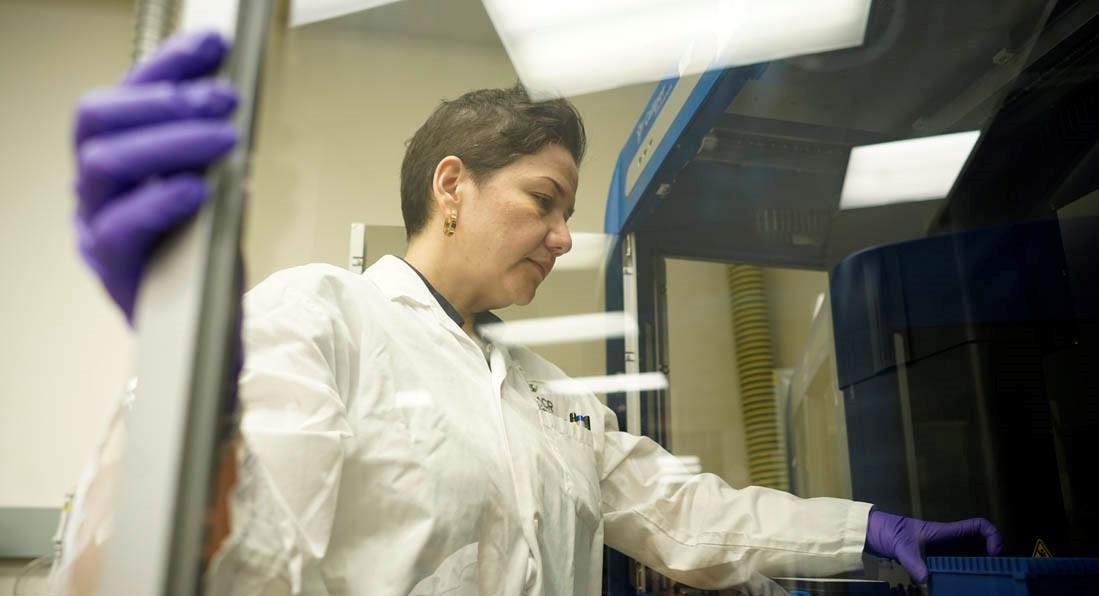The highly sensitive Plasma Whole Genome Sequencing assay is available for clinical research studies for any tumour type through OICR’s accredited genomics lab.
A new blood test proven to detect residual signs of cancer could revolutionize how treatments are monitored and assessed, and it’s now available to research studies through the Ontario Institute for Cancer Research (OICR).
OICR Genomics’ Plasma Whole Genome Sequencing assay tests patients’ blood for the unique molecular fingerprint of thousands of mutations unique to their individual cancer. This broad approach enables highly sensitive detection of tiny pieces of tumour DNA that are shed into the bloodstream by cancer cells — a sign that cancer is still present even when it’s not detectable with other tests.
Tests that use blood samples, known as ‘liquid biopsies’, are an exciting alternative to traditional biopsies because collecting blood samples is easier and less invasive than surgical removal of tumour tissue.
“We have been sequencing whole genomes from tumours for three years now,” says Dr. Trevor Pugh, OICR Senior Investigator and Director of Genomics. “This test is an evolution of that capability to start looking for fragments of the cancer genome in blood at an extremely low level. Now, we can support a whole new type of clinical trial design whereby a blood sample can tell a physician very early on whether an initial treatment is working or whether a patient should be expedited to an alternate therapy.”
The test, which is currently only available to clinical trials, works in conjunction with OICR’s other genome sequencing services. Patients can have DNA from a tumour sample sequenced to help diagnose their cancer and direct them to a personalized treatment. Then they can have a blood sample taken during or after their treatment to see how effective it was, and whether their cancer is likely to recur.
Because the test can detect even a small number of cancer cells, it can help find cancer recurrence early so that it can be treated before it comes back fully.
Developed by OICR Genomics over the past 14 months, the Plasma Whole Genome Sequencing assay meets all standards for accuracy, sensitivity, specificity, and reproducibility. It adds to OICR Genomics’ world-leading genomics services, which include the latest in whole genome and transcriptome sequencing technology.
“The most challenging part of validating these tests is having matched, high-quality blood and tumour samples for comparison. We were fortunate to collaborate closely with the OCTANE study at the Princess Margaret Cancer Centre that had the foresight to bank blood plasma samples perfectly matched to the tissues used to validate our original tumour test,” Dr. Pugh added.
OICR Genomics is also the first lab in North America to be accredited by the three major accreditation organizations for whole genome and transcriptome sequencing: Clinical Laboratory Improvement Amendments (CLIA), the College of American Pathologists (CAP) and Accreditation Canada Diagnostics (ACD).
“This means that researchers and clinicians can feel confident that our services meet the highest possible standards,” says Dr. Carolyn Ptak, Senior Program Manager and Quality Assurance Lead for Genomics at OICR. “And this new assay is no exception.”
“This world-first assay is an exciting development for clinical research in Ontario and around the world, and a major step forward in our ability to provide personalized treatment to everyone with cancer,” says OICR President and Scientific Director Dr. Laszlo Radvanyi. “It is another example of how OICR is leading the charge in developing innovative and cutting-edge technologies that benefit cancer patients. Congratulations to OICR’s Genomics team and everyone who made this tremendous achievement possible.”
Find out more on the OICR Genomics website.



